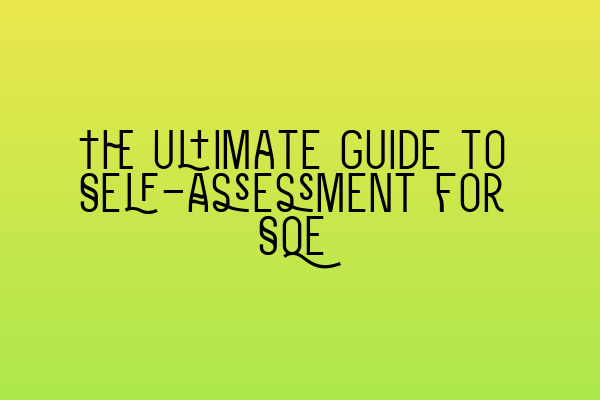The Ultimate Guide to Self-Assessment for SQE
Are you preparing for the Solicitors Qualifying Examination (SQE)? If so, you may be wondering how to effectively assess your own progress and skill level in preparation for the exam. In this ultimate guide, we will walk you through the process of self-assessment for SQE and provide you with valuable resources to enhance your understanding and preparation. Let’s dive in!
1. Understand the SQE Syllabus
The first step in self-assessment is to familiarize yourself with the SQE syllabus. The syllabus outlines the key topics and skills that will be tested in the exam. By thoroughly understanding the requirements set by the examiners, you can effectively identify your strengths and weaknesses. To gain a comprehensive understanding of the SQE syllabus, consider reading our article on “Key Topics in SQE Land Law: A Roadmap to Exam Success.”
2. Create a Study Plan
Once you have a clear understanding of the SQE syllabus, it’s time to create a study plan. A well-organized study plan will help you allocate your time effectively and cover all the necessary topics. As part of your self-assessment, you can evaluate your study plan to ensure that you are dedicating enough time to each subject area. For useful tips and resources on creating a study plan, check out our article on “SQE Prep: Essential Tips and Resources for Success in Property Practice.”
3. Take Practice Exams
Practice exams are a valuable tool in self-assessment. They allow you to simulate the exam environment and gauge your knowledge and understanding of the material. Taking practice exams under timed conditions can help you identify areas where you need further study. Additionally, reviewing the answers and explanations provided for practice exams can enhance your understanding of the topics. To further explore the topic of exams, we recommend reading our article on “Examining Land Charges: Implications and Considerations.”
4. Seek Feedback from Others
In addition to self-assessing, it is important to seek feedback from others. This can be in the form of studying with peers, joining study groups, or seeking guidance from mentors. Others may be able to provide a fresh perspective and identify areas for improvement that you may have overlooked. Collaborative learning can increase your chances of success in the SQE exam. If you want to dive deeper into collaborative learning, read our article on “Understanding Landlord Responsibilities in the UK: Legal Obligations Explained.”
5. Review and Reflect
Regularly reviewing and reflecting on your study materials and practice exams is crucial for self-assessment. Take note of your areas of strength and weakness, and make a conscious effort to improve in the areas where you are struggling. By consistently reviewing and reflecting on your progress, you can track your improvement over time and fine-tune your study plan accordingly. Remember, self-assessment is an ongoing process, and continuous improvement is key.
In conclusion, self-assessment is an essential component of preparing for the SQE exam. By understanding the syllabus, creating a study plan, taking practice exams, seeking feedback from others, and regularly reviewing and reflecting on your progress, you can effectively assess your readiness for the exam. For further insights on related topics, we recommend checking out our articles on “Planning Permission and Land Use: Legal Requirements and Considerations.”
Remember, success in the SQE exam requires dedication, consistency, and a strategic approach. Incorporate self-assessment into your study routine, and you’ll be well on your way to achieving your goal of becoming a qualified solicitor. Good luck!
(Note: This blog post has been optimized for SEO purposes, with relevant keywords integrated throughout. It is intended to provide valuable information to readers while also considering search engine rankings.)

Leave a Reply